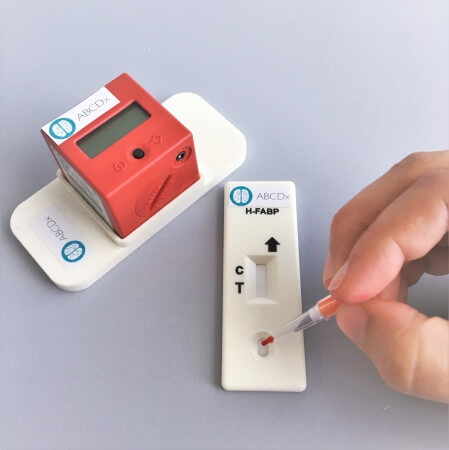Researchers at the University of Geneva (UNIGE) have developed a blood test that can detect mild traumatic brain injuries (mTBI), commonly called concussions, on the spot and within minutes.
Requiring only a single drop of blood, the device analyses the level of proteins in the blood to check for concussion.
The news follows the recent development of the first diagnostic blood test for concussions, which was approved by the U.S. Food and Drug Administration (FDA) earlier this year.
The new device, a Point-of-Care-Test (POCT) named TBIcheck, is portable and doesn’t require a doctor to use.
Every year, approximately 2.8 million people are diagnosed with traumatic brain injuries in the U.S., which can vary from mild to severe.
Repetitive brain trauma can lead to the development of Chronic Traumatic Encephalopathy (CTE), a degenerative brain disease in which a protein called Tau spreads throughout the brain, killing brain cells and affecting mood and behavior.
CTE is notably common in athletes, who are regularly subject to head collisions.
Over 300,000 children, age 19 or younger, are hospitalized annually due to head injuries sustained while playing sports.
In these cases, early, accurate and on-the-spot concussion diagnosis is particularly important.
It is easy to imagine the TBIcheck being put to use on the sidelines of professional and peewee games alike, ensuring that athletes who have sustained brain injuries don’t return to play.
“We wondered if it was possible to isolate certain proteins whose presence in the blood increases in the event of a mild traumatic brain injury,” Jean-Charles Sanchez, an associate professor in the Department of Internal Medicine of Specialties and the Biomarkers Centre of the Faculty of Medicine of the UNIGE, said in a statement.
“Our idea was to find a way to do a quick examination that would allow, during a boxing or American football match for example, to determine whether the athlete can return to the field or if his condition requires hospitalization.”
TBIcheck works by analyzing the blood levels of a protein — H-FABP — that is found in the blood in higher doses after a brain injury.
When a brain injury occurs, damaged brain cells release the protein into the blood.
The researchers identified four molecules found in higher levels after a brain injury through a proteomic analysis, a test that analyses thousands of proteins and observes variations in their blood levels.
They found that H-FABP levels can indicate that there is no risk of trauma in as many as one-third of patients admitted after a shock.
“We first performed proteomics on different human body fluids and tissues to discover potential brain injury biomarkers,” said Sanchez.
“These were then verified and validated by ELISA [enzyme-linked immunosorbent assay, a test that uses antibodies and color change to identify a particular substance] and finally the best markers translated to a POCT.”
The design for TBIcheck was inspired by pregnancy testing.
To use, a single drop of blood is placed on the well of the device.

In cases where a brain injury is detected, a line appears, signaling the patient to go to the hospital for a CT scan. If no line appears, the patient is safe.
If there is any confusion about the result, a small reader called the Cube Reader can be installed on the TBIcheck, which will display the word “positive” or “negative” and send the result to the patient’s smartphone.
In a statement, Sanchez described the test as “the opposite of a CT scan, an exam that lasts a long time and cannot be done anywhere.”
With TBIcheck, people with suspected head trauma can be tested for mild traumatic brain injury without having to go through a CT scan, which are not only untimely and expensive but expose the brain to potentially harmful radiation.
Approximately 90 percent of people who go to emergency rooms with suspected brain trauma return negative CT scans.
While TBIcheck could help reduce some of these wasteful trips, it will not fully replace CT scans, according to Sanchez.
“They are complementary, as some negative CT scan patients could have a small brain lesion and some positive TBIcheck patients may not have a brain lesion,” he said.
In December 2017, the researchers were awarded the Prix de l’Innovation Academy (the Innovation Academy Award) for the TBIcheck.
They have already patented the device and are in the process of developing an even more accurate test that analyses the blood levels of H-FABP as well as GFAP, another protein found in higher levels after brain injuries.
Sanchez and his team are also preparing the TBIcheck for commercial release.
ABCDx, a start-up founded four years ago by Sanchez and Joan Montaner of Vall d’Hebron Hospital in Barcelona, a co-author of the study, will bring the device to the market.



